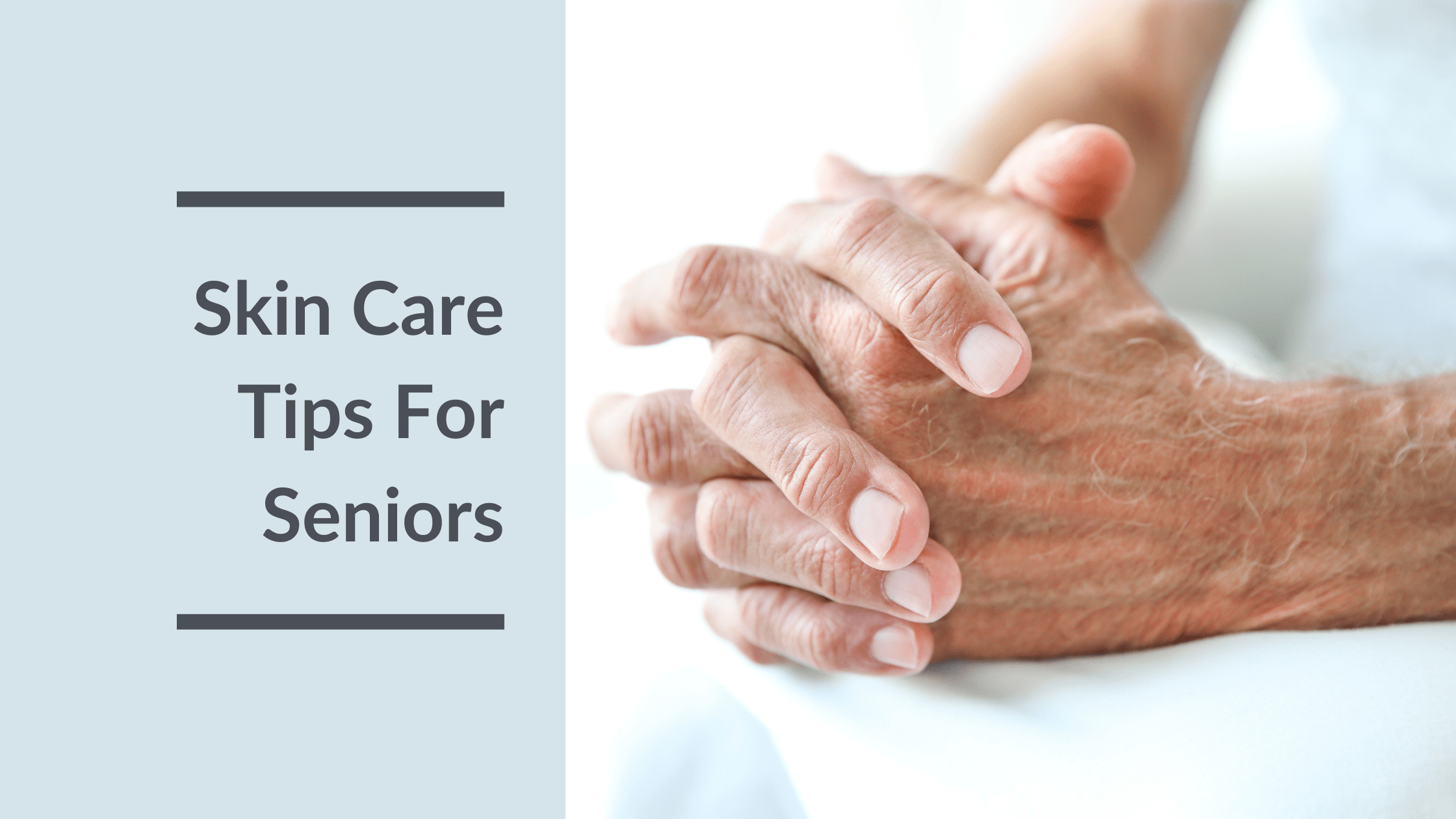
May is National Melanoma and Skin Cancer Awareness Month. And with summer fast approaching, it’s the perfect time to address the importance of proper skin care for seniors.
Updated June 23, 2022
Promoting Healthy Skin Care For Seniors
May is National Melanoma and Skin Cancer Awareness Month. And with summer fast approaching, it’s the perfect time to address the importance of proper skin care for seniors.
Regular cleaning, moisturizing, and sun protection are essential to a proper skincare routine. While these can keep your face glowing and healthy, the benefits go deeper than surface level, such as slowing the aging process and reducing your cancer risk.
Skin problems arise at any age. However, older adults, in particular, are susceptible to itching, dry skin, bruising, age spots, skin tags, melanoma, and other issues. Fortunately, a consistent skincare regimen is easy to incorporate into any daily routine and will go a long way to promote your wellbeing.
What Older Adults Should Know About Melanoma
Skin cancer is the most frequently diagnosed form of cancer in the US. Every day, 9,500 new cases are diagnosed. Additionally, roughly 1 in 5 people will develop skin cancer.
Although the figures are alarming, skin cancer is highly preventable – and treatable. Since 2014, the melanoma death rate has fallen by almost 4%, likely thanks to growing awareness and education about the risks.
Educating yourself about melanoma and other cancers can help you understand what to look for and how to lower the risk.
Skin Cancer Vs. Melanoma
Skin cancer often develops from excessive UV exposure from the sun or tanning beds. Skin cancer is an abnormality in the skin cells that results in continuous growth, leading to malignant tumors caused by DNA damage.
On the other hand, melanoma typically develops as a brown, blue, or black tumor, although some are white, pink, or tan. This form of skin cancer develops in a melanocyte cell, which produces a dark pigment known as melanin.
Melanoma causes more deaths than any other type of skin cancer. In the US, one person dies from melanoma every hour.
Melanoma Risk Factors
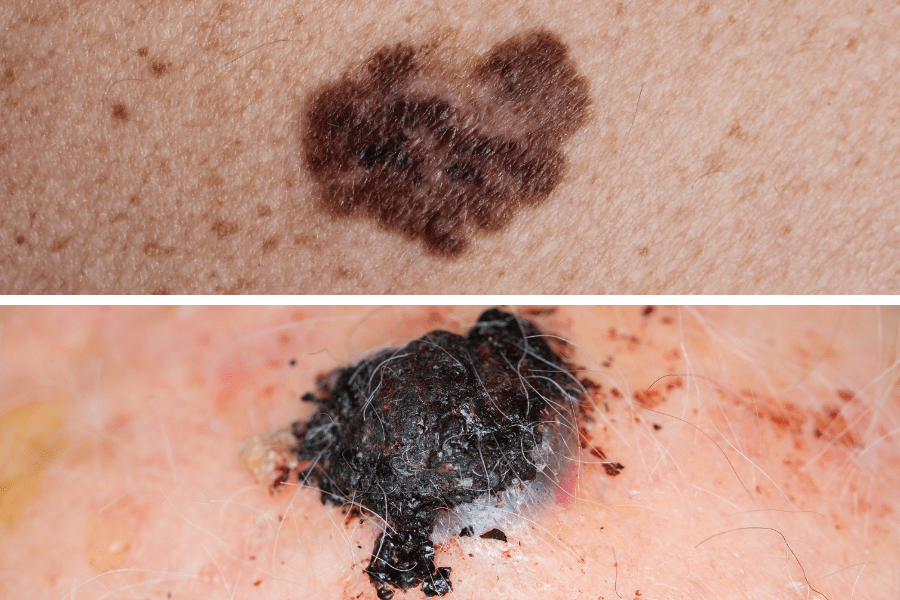
It’s important to realize that anyone can develop melanoma. However, there are a few risk factors that increase the likelihood of a person developing this disease, including:
- Family history
- Fair or pale skin that is prone to freckling
- Individuals with multiple moles or moles that are large or uneven
Causes Of Melanoma
- UVA and UVB rays: 90% of diagnoses are associated with overexposure to sunlight, sunlamps, or tanning beds, which increase the chance of melanoma and other skin cancers.
- Moles: Being mindful of any new marks or moles on your body is crucial to recognizing melanoma before it progresses.
- Genetics: You can be predisposed to melanoma if you carry a mutated gene. Knowing your family’s history is important to protect yourself from this disease.
Causes Of Melanoma
- Multicolored moles
- Asymmetrical moles
- Unusual or atypical moles
- Variations in existing moles
- Irregular edges around the mole
- Moles that are larger than a pencil eraser
How To Prevent Melanoma
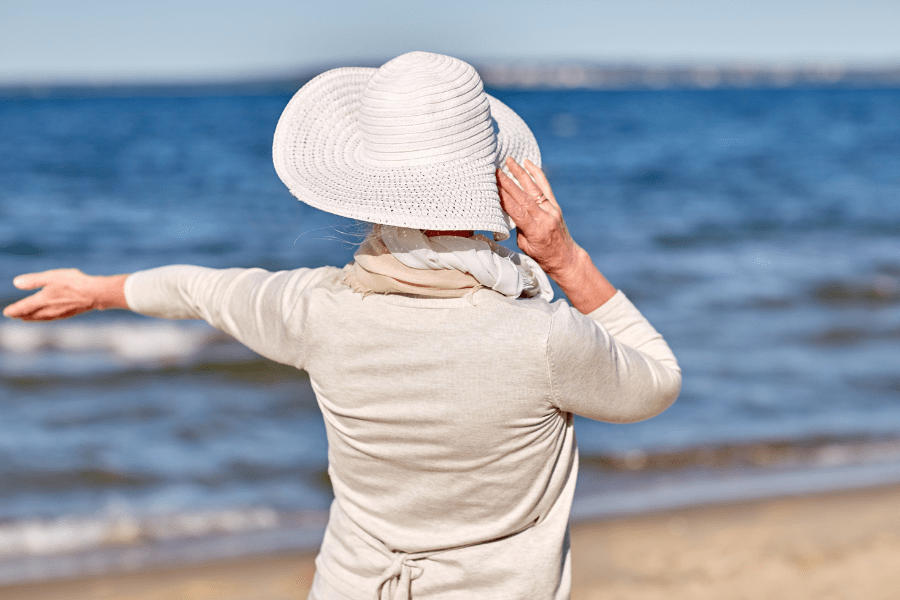
Although this form of cancer is prevalent, it is highly preventable. The following tips will keep your skin healthy and lower your risk for melanoma:
- Avoid sunburns
- Daily sunscreen
- Wear SPF 50 or higher
- Assess your skin each month
- Stay in the shade when possible while outside
- Schedule a yearly skin exam with your physician
- Don’t use tanning beds or sun lamps that emit UV rays
The Skin Cancer has provided a guide for at-home skin assessments. However, because cancer can spread so quickly, you should take monthly self-checks seriously and incorporate them into your monthly routine.
Common Skin Issues For Seniors
Make sure to discuss these common age-related skin issues with your doctor if they worsen or impact your quality of life.
Itchy, Dry Skin
Older adults often experience dry patches on their skin, particularly on the lower legs, elbows, and lower arms. These spots, which can feel rough or even scaly, can occur due to:
- Stress
- Smoking
- Arid climates
- Inadequate water intake
- Overexposure to sunlight or tanning beds
Reduced sweat and oil glands, which frequently occur with aging
Certain medications and health conditions (such as diabetes or kidney disease)
Frequent washing, antiperspirants, perfumes, and hot water (even for baths and showers) can worsen the issue.
Itchy, dry skin is uncomfortable and can interfere with your quality of life. You can relieve this issue by using:
- A humidifier
- Milder soaps
- Daily moisturizers
- Warm – rather than hot – water
If none of these work, talk to your doctor. They may recommend topical treatments, vitamin supplements, or a prescription.
Bruising
Bruising is another common skin issue for older adults. You may notice more bruises as an adult than when you were younger. That’s because as we age, our skin literally gets thinner. In addition, we lose some protective layer of fat that protects blood vessels from injuries. As a result, we bruise more easily and take longer to heal.
Additionally, some prescriptions and physical conditions can make you more susceptible to developing bruises.
To avoid minor bruises, here are a few tips to prevent injuries:
- Avoid throw rugs, particularly on stairs
- Check your vision and hearing regularly
- Make sure rooms and hallways are well-lit
- Keep rooms, halls, and stairways clutter-free
- Keep walkways free of furniture and electrical cords
- Check if your medication has side effects such as dizziness or drowsiness
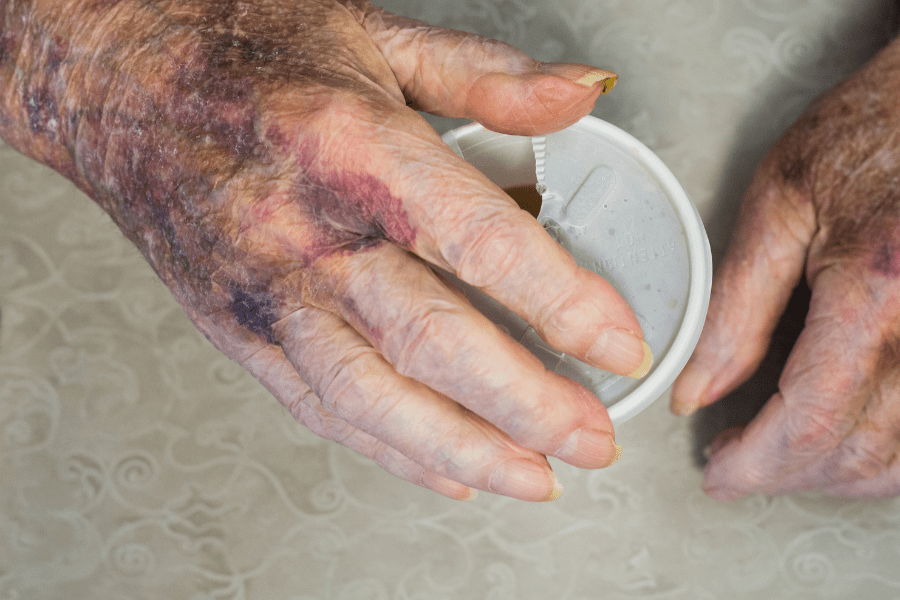
Wrinkles
Fine lines and wrinkles are unavoidable, but they’re also completely natural. These develop as your skin loses its elasticity over time. While you can’t completely prevent this process, a proper skincare routine can slow the skin’s aging process and keep it glowing and healthy. As mentioned earlier, that includes avoiding excessive UV rays, alcohol, caffeine, smoking, and drinking plenty of water every day.
Skin Tags & Spots
Those little brown spots appear on your skin after a lifetime of sun exposure. Age spots are generally larger than freckles and typically appear on the face, hands, arm, back, and feet. Regular sunscreen use can help stop these spots from forming.
Skin tags are small, skin-colored skin growths that feel like bumps on the surface of your skin. They often develop with age, particularly in women, and can develop on the eyelids, neck, armpits, chest, and groin.
Skin Care Tips For Seniors
Maintain A Balanced Diet
Eating diverse foods rich in vitamins, nutrients, and minerals supports overall body function. In addition, eating right promotes faster skin repair and reduces sensitivity to bruising. Look for foods high in vitamins A, C, and E, such as fish, fruits, and nuts.
Stay Hydrated
Of course, hydration is crucial for staying healthy no matter your age. Water helps remove toxins and moisturize your skin, preventing dryness and itchiness. In addition, staying hydrated can help you think clearer and avoid “brain fog,” which could unintentionally lead to injury.
Moisturize
If you’re looking for the best product that supports healthy skin care for seniors, you might find the sheer number of options overwhelming. So to keep things simple, stick to moisture-rich soaps and lotions because they help replenish the skin’s moisture barrier. Also, avoid products with artificial dyes and perfumes because they contain chemicals that could dry or irritate the skin.
Similarly, humidifiers can also keep your skin moisturized, especially during colder months when the air is dry. Another way to retain moisture is to avoid excessive skin washing, which can aggravate the tissues and lead to further dryness.
Apply Sunscreen Daily
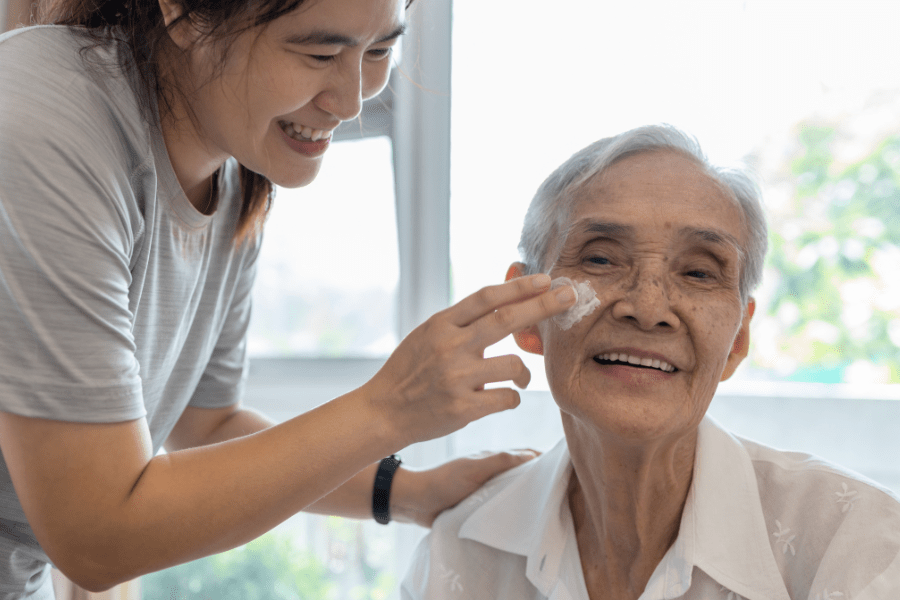
A little bit of sun is healthy, especially since it is a natural source of vitamin D. But too much of it can damage your skin and lead to long-term health problems and chronic conditions like skin cancer.
Older adults, in particular, should exercise caution when outdoors because their skin is more vulnerable to harmful UV rays. To avoid sunburns, dry skin, or even cancer, seniors should take steps such as:
- Apply SPF 50 or greater
- Avoid prolonged sun exposure
- Wear protective clothing, such as hats, sunglasses, or long-sleeves
Some medications increase skin sensitivity. So just in case, review your prescriptions for any side effects.
Be Mindful Of Your Body
Be aware of new blemishes or spots on your skin, and call your physician immediately if you notice something out of the ordinary.
MeetCaregivers Supports Healthy Skin Care For Seniors
MeetCaregivers provides qualified professionals to assist with any needs you may have. Contact us at 1-888-541-1136 to learn more about our services, or Find A Caregiver to get started today.
Visit our Blog to find more information about senior health and safety, caregiver resources, and more.
- AMG, Scripps. “Skin Cancer Awareness Month: What You Need to Know About Melanoma.” Scripps Affiliated Medical Groups, Scripps Affiliated Medical Groups, 8 May 2018, scrippsamg.com/parents/skin-cancer-awareness-month-need-know-melanoma/.
- “Healthy Skin Tips for Seniors.” In Home Personal Services, 13 Apr. 2018, www.ihps.com/healthy-skin-tips-seniors/.
- Mayo Clinic Staff. (2022, April 20). Easy bruising: Why does it happen? MayoClinic.org. Retrieved June 23, 2022, from https://www.mayoclinic.org/healthy-lifestyle/healthy-aging/in-depth/easy-bruising/art-20045762
- “Skin Care and Aging.” National Institute on Aging, U.S. Department of Health and Human Services, www.nia.nih.gov/health/skin-care-and-aging.
